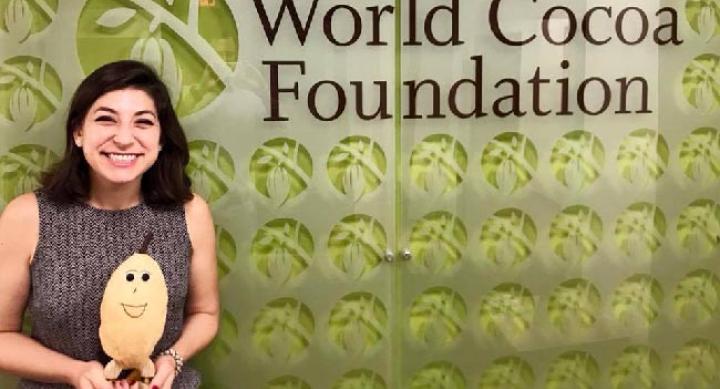
Guest blog post by Melanie Levine, DC Fellow
The Eleanor Crook Foundation supports students working summer internships for nonprofit, nongovernmental or governmental organizations that conduct development projects in the developing world. Student recipients, called Crook Fellows, share the value of their experiences in a series of blog posts.
More from the Crook Fellows:
- LBJ student works on Capitol Hill to end hunger
- When chocolate intersects with public policy
- LBJ student interns with health care, education startups in Ghana
- LBJ student supports a nonprofit during a crisis
The World Cocoa Foundation (WCF) may sound like an atypical organization to host a Master of Public Affairs student for a six-month Policy Apprenticeship. When I tell friends, peers and alumni where I am working in DC, I often see looks of confusion and delight simultaneously appear on their faces.
Usually, the first question they ask is: "Do you get free chocolate?" The answer to that question: Absolutely! The second question is often: "What does cocoa have to do with public affairs?" I have been exploring the answer to this question over the past few months, and I can decidedly share that cocoa and chocolate have more to do with policy than many people may think.
"I can decidedly share that cocoa and chocolate have more to do with policy than many people may think." — Melanie Levine
WCF's mission is "to catalyze public-private action to accelerate cocoa sustainability." We accomplish this goal through "champion[ing] multistakeholder partnerships, aligned public and private investment, policy dialogue and joint learning and knowledge sharing to achieve transformative change in the cocoa supply chain." With member companies such as Mars, Nestle, Hershey and Lindt, WCF unites the sector around sustainability priorities and helps move the needle when it comes to critical social and environmental challenges facing the supply chain. After all, the global population consumes over 4.5 million tons of cocoa beans annually, so there is room for serious impact!
I work with the International Programs Team at WCF, supporting public and private donor-funded programs and research projects. For example, I am helping to design the Grand Challenge for Data in Development in the West African cocoa sector, a program that will make public a wide array of cocoa sector datasets and challenge data analysts to develop novel insights that can strengthen WCF’s understanding of the complex supply chain. I am also writing a research paper about sustainable cocoa investment in Colombia and drafting a memo about the Brazilian agricultural policy landscape that will bolster WCF’s expanded work in the country.
"Policy impacts the way cocoa is produced, certified, traded, marketed and consumed." — Melanie Levine
I have learned a significant amount about the complex intersections of policy and chocolate. Policy impacts the way cocoa is produced, certified, traded, marketed and consumed. Governmental systems, public-sector capacity and the coordination between public and private entities heavily influence farmers' access to extension information and planting material—both critical resources for quality cocoa production and higher incomes. Policy decisions inform the extent to which cocoa production affects the environment, as well as the status of labor rights in the supply chain. Land tenure policy and governmental enforcement of land policy influence how farmers grow cocoa, invest in their land, participate in deforestation activities, send their children to school and feed their families. Ensuring that policy is reflective of the needs of society and the environment must be an aligned effort across not only origin country governments, but also the private companies and other stakeholders that interact with the food system as a whole.
While I cannot deny that free chocolate is a serious perk of my role at WCF, I will say that the most rewarding aspect of the job is the knowledge WCF unites governments and companies to mitigate the impact of cocoa production on the environment and improve the lives of cocoa farmers around the world. Cocoa sector sustainability—as well as agricultural sustainability more broadly—is a complex goal that involves significant efforts across the private, nonprofit and public sectors. Public policy plays a critical role in strengthening and improving the agricultural supply chains, and I hope to leverage my academic background from the LBJ School as well as my experience at WCF to make the system more sustainable throughout my career.

